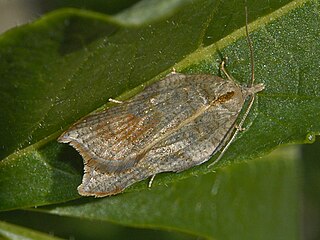
Acleris emargana, the notched-winged tortricid, is a moth of the family Tortricidae. The species was first described by Johan Christian Fabricius in 1775.

Acleris is a genus of moths belonging to the subfamily Tortricinae of the family Tortricidae. As of 2007, about 241 species were known.

Acleris hastiana is a moth of the family Tortricidae. It is found in Europe, northern Iran, Kazakhstan, Ala Tau, central Siberia, Irkutsk, the Amur region and China. In North America it is found from the north-eastern United States across southern Canada to British Columbia and south along the Pacific Coast to California.
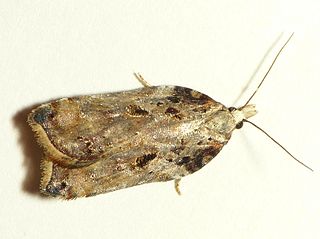
Acleris cristana, the rufous-margined button moth, is a moth of the family Tortricidae and is found from Europe through the Caucasus and Ussuri to Japan.
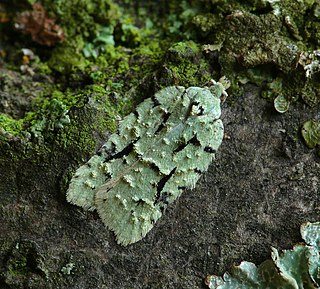
Acleris literana, the sprinkled rough-wing, is a moth of the family Tortricidae. The species was first described by Carl Linnaeus in his 1758 10th edition of Systema Naturae. It is found in most of Europe and in the Near East.

Acleris ferrugana is a species of moth of the family Tortricidae. It is found in China, most of Europe and has also been recorded from North America.

Acleris schalleriana, the viburnum button or Schaller's acleris moth, is a moth of the family Tortricidae. It was described by Carl Linnaeus in 1761. It is found in most of Europe. It is also found in North America. Acleris viburnana is a possible synonym that refers to the North American populations.
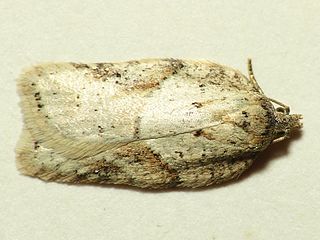
Acleris logiana, the black-headed birch leaffolder moth or grey birch button, is a moth of the family Tortricidae. It was described by Carl Alexander Clerck in 1759. It is found in most of Europe, except Ireland, Portugal, most of the Balkan Peninsula and Ukraine. It is also found in North America, the Russian Far East, Korea and Japan.

Acleris quercinana is a species of moth of the family Tortricidae. It was described by Zeller in 1849. It is found in most of Europe, Asia Minor and Iran.

Acleris lacordairana is a species of moth of the family Tortricidae. It is found in Germany, Austria, Switzerland, Italy, Hungary, Poland, Estonia, Latvia and Russia. In the east, the range extends to Japan.
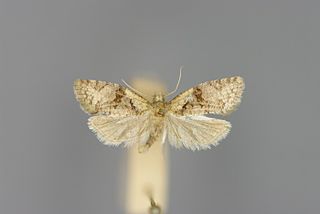
Acleris notana is a species of moth of the family Tortricidae. It is found in Iceland, Ireland, Great Britain, Spain, France, the Benelux, Germany, Denmark, Austria, Switzerland, Italy, the Czech Republic, Slovakia, Slovenia, Poland, Hungary, Romania, Norway, Sweden, Finland, the Baltic region, Ukraine and Russia. It is also found in North America, where it has been recorded from Illinois. The habitat consists of scrub, heathlands, moorlands and woodlands.

Acleris shepherdana, the meadow-sweet button, is a species of moth of the family Tortricidae. It is found in Europe, where it has been recorded from Great Britain, France, the Benelux, Germany, Denmark, Austria, Switzerland, Italy, the Czech Republic, Slovakia, Poland, Hungary, Norway, Sweden, Finland, the Baltic region and European Russia. It is also found in the Russian Far East (Ussuri), Manchuria, Mongolia, China and Japan. The habitat consists of fens, marshes, river-banks and other damp areas.

Acleris umbrana is a species of moth of the family Tortricidae. It is found in Great Britain, France, Belgium, Germany, Austria, Switzerland, Italy, the Czech Republic, Slovakia, Poland, Hungary, Norway, Sweden, Finland, the Baltic region and Russia. In the east, the range extends to Japan. The habitat consists of woodland, fens and marshes.
Acleris filipjevi is a species of moth of the family Tortricidae. It is found in South Korea, China, Japan and Russia.

Acleris hispidana is a species of moth of the family Tortricidae. It is found in South Korea, China, Japan and Russia.
Acleris kodamai is a species of moth of the family Tortricidae. It is found in South Korea, China and Japan.
Acleris longipalpana is a species of moth of the family Tortricidae. It is found in South Korea, China, Japan and Russia (Ussuri).
Acleris strigifera is a species of moth of the family Tortricidae. It is found in China, Japan and Russia.
Acleris maculidorsana, the stained-back leafroller moth, is a species of moth of the family Tortricidae. It is found in North America, where it has been recorded from Arkansas, Florida, Georgia, Kentucky, Maine, Maryland, Massachusetts, Michigan, Mississippi, New Jersey, North Carolina, Ohio, Ontario, Pennsylvania, South Carolina, Tennessee, Virginia and Wisconsin.
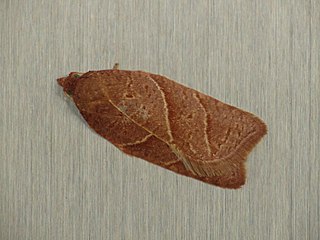
Acleris platynotana is a species of moth of the family Tortricidae. It is found in China, Japan and the Russian Far East. The habitat consists of rhododendron groves and black birch-oak-pine forests.















